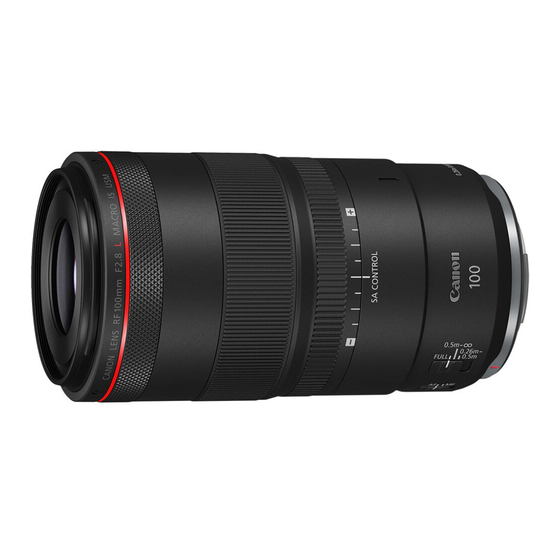Canon RF100mm F2.8 L MACRO IS USM Anleitung Handbuch - Seite 15
Blättern Sie online oder laden Sie pdf Anleitung Handbuch für Kameraobjektiv Canon RF100mm F2.8 L MACRO IS USM herunter. Canon RF100mm F2.8 L MACRO IS USM 23 Seiten.

8. Exposure When Taking Close-up (Macro) Shots
Setting the Exposure
When taking photographs using TTL metering,
no exposure compensation is necessary because
the light coming through the lens is measured.
With TTL metering, photographing with AE (auto
exposure) is possible at all focusing distances.
Just select the desired picture-taking mode, then
check the shutter speed and aperture before
taking a picture.
Magnification and Effective f-number
The aperture displayed on the camera assumes
that the focus is set to infinity (∞). The actual
aperture (effective f-number) becomes darker
(effective f-number increases) at closer focusing
distances (magnification increases). This has
almost no influence on the exposure for normal
picture taking. However, for close-up (macro)
shooting, the change in the effective f-number is
more than negligible.
When deciding the exposure using a hand-held
exposure meter, apply the following exposure
factor.
Magnification (x)
Focusing distance (m/ft.)
Effective f/No.
Exposure factor (stops)*
* Upper values: 1/3 stops. Lower values: 1/2 stops.
Conditions of the subject are very important when
z
deciding on the correct level of exposure for
close-up (macro) shooting.
It is therefore recommended that you change
the exposure level as much as possible during
shooting, or that you take pictures while checking
the images on the camera's LCD monitor.
During close-up (macro) shooting, it is
z
recommended that you use either the aperture-
priority AE (Av) mode or manual exposure (M)
mode, in which adjustment of the depth of field
and exposure is easier.
0.5
1.0
1.4
0.38/
0.28/
0.26/
1.25
0.92
0.86
4.5
5.7
6.6
+4/3
+2
+7/3
+3/2
+2
+5/2
ENG-14
